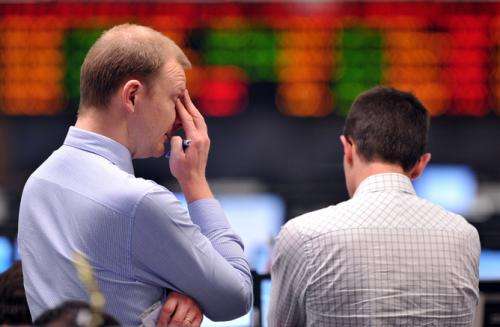High stress during times of financial instability leads to greater risk aversion, potentially worsening any downturn. Credit: AAP/Paul Miller
New evidence suggests investors have a greater appetite for taking risks when market conditions are good, and are more averse to risk when markets are lower.
But this means traders could exhibit risk-averse behaviour at the exact time economies most need risk takers, such as following a market crash.
The Cambridge University-led research, which included contributions from the Queensland University of Technology Business School, found rising levels of stress in times of crisis led to risk aversion.
This is in contrast to the commonly held view that openness to risk-taking is a stable trait, according to the paper published today in the prestigious Proceedings of the National Academy of Sciences journal.
Researchers concluded that this behaviour would "exaggerate the peaks and troughs, thereby contributing to financial instability".
Paul Kofman, a professor of finance at the University of Melbourne, said that while some people respond well to high levels of stress, "the vast majority try to extricate themselves from the added stress levels".
"We saw this after the Global Financial Crisis," Professor Kofman said. "After it had been done and gone, that was the worst time for investors to start to liquidate their portfolios and get out of the equity market."
"Where there are these stress pressure points, investors will look for safe investment opportunities like gold where, at least in their perception, there isn't much volatility."
"Equity prices have already collapsed, so they sell when prices are nearing the bottom level, which contributes even further to the volatility. It becomes a circular argument, they create their own stress," he said.
"But where there are these stress pressure points, people will go into markets where, at least in their perception, there isn't much volatility."
The research, which included psychiatric health researchers and business lecturers, raised cortisol levels in 36 volunteers by 68% for eight days.
The volunteers were then asked to take part in a "lottery-style risk-making task with real monetary payoff".
While the higher levels of cortisol – a hormone released in response to stress – did not effect behaviour in the first few days, researchers observed safer lottery bets over the course of the trial.
Amanda Biggs, a post-doctoral research fellow at Griffith University, says there are a number of other variables that affect how people will deal with increased stress.
She says there are circumstances in which work pressure leads to more risk-taking behaviours because it impairs decision-making and reduces self-control.
"However, work pressure can also cause some individuals to become more cautious about taking risks if they wish to avoid losses, which may adversely affect performance in the finance industry," she said.
Dr Biggs says prolonged exposure to even mild stress also "prolongs physiological reactivity to stress", which in turn has more potential to affect long-term health.
"Consequences for individuals may be psychological, physical, and behavioural," she said.
Kathryn Page, a research fellow at the Melbourne School of Population Health, currently undertakes research in workplace stress, looking at various industries including white collar environments.
She says workplace stress in these environments, as with most industries, is often blamed on workers.
"What's unique about a white collar environment is a perception that workers choose to take more on because of a need to achieve and so in some way are to blame for the stress."
She says the correlation between higher stress in uncertain times and risk-aversion "makes sense" because it comes down to low job control.
While high stress led to risk-aversion and exaggerated economic instability, Dr Page said it was also important to remember the health implications of stress for traders.
"Research shows that chronic stress can exacerbate or lead to diagnosable depression or anxiety," she said.
In fact, statistics shows that job strain is responsible for 17% of all cases of depression in working women, and 13% for men.
More information: medicalxpress.com/news/2014-02 … rigger-aversion.html
Journal information: Proceedings of the National Academy of Sciences
Provided by The Conversation
This story is published courtesy of The Conversation (under Creative Commons-Attribution/No derivatives).
![]()




















